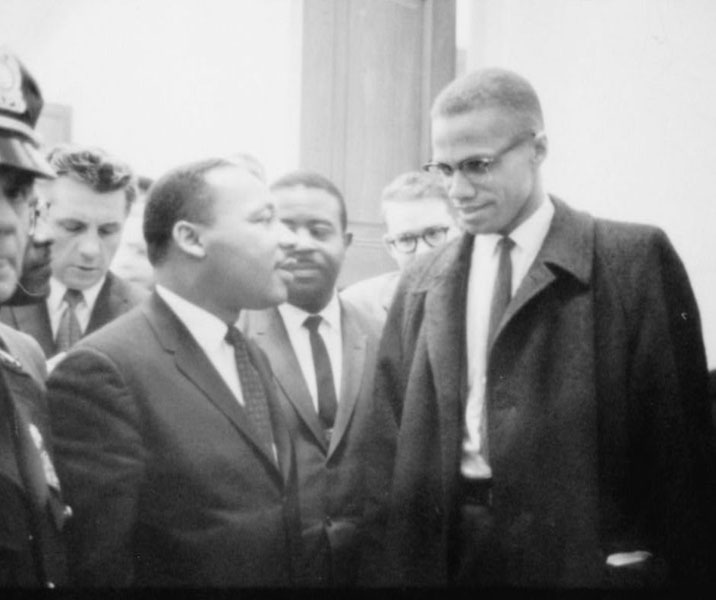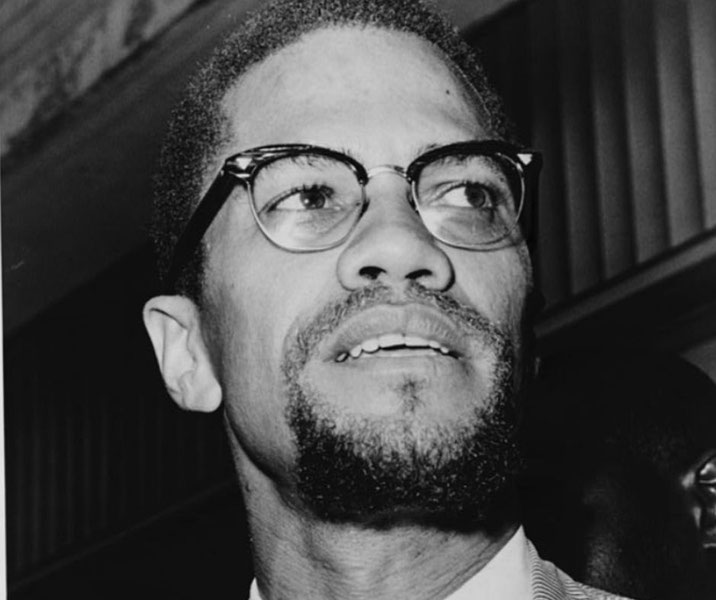The dramatic life of Malcolm X: From street hustler to civil rights icon

Malcolm X was one of the most influential and controversial figures of the civil rights movement. His journey from a troubled youth to a beacon of empowerment remains one of the most compelling stories of modern American history.
He was a passionate advocate for the rights of African Americans. At a time when peaceful protests dominated the civil rights movement, Malcolm X delivered a message of resistance, self-defense, and black pride that both inspired and unsettled millions.
Malcolm X's difficult childhood
Malcolm X was born with the name Malcolm Little in Omaha, Nebraska, on May 19, 1925.
His father, Earl Little, was a Baptist preacher and an active member of the Universal Negro Improvement Association (UNIA).
His mother, Louise Norton Little, was a homemaker. In 1926, while he was still a baby, the family moved to Lansing, Michigan to escape threats made upon them by the Ku Klux Klan.
Even in their new city, Malcolm's family was frequently harassed by white supremacists, and their house was burned down by members of the Black Legion, a white supremacist group.
Unfortunately, Earl Little died when Malcolm was only six years old. His death was officially ruled an accident, though the Little family suspected foul play by the Black Legion.
Not long after her husband's passing, Louise Little suffered a nervous breakdown and Malcolm, with his siblings, were placed in foster care.
Malcolm dropped out of school at the age of 15 after losing interest in formal education and, in 1942, at the age of 17, he moved to Boston to live with his half-sister, Ella Collins in the Roxbury neighborhood.
After working various small jobs, he then moved to New York City in 1943, where he lived in the area of Harlem.
It was at this time that became involved in criminal activity, including hustling, drug dealing, and theft.
Malcolm eventually returned to Boston in 1945 and started a burglary ring with his friend Shorty, their friend Rudy, his girlfriend Sophia, and her sister.
They were eventually caught in 1946, and Malcolm X was sentenced to eight to ten years in prison at the age of 20.
Despite the average sentence for first-time burglary convictions being only two years, his sentence was harsher.
Time in the Nation of Islam
While serving his time in Charlestown State Prison, Malcolm X actively sought to educate himself by reading extensively.
He also started to study the teachings of the religious and political group called the Nation of Islam (NOI).
The NOI was founded by Wallace Fard Muhammad in Detroit in 1930. It was a black nationalist organisation that preached separation from white society and self-reliance for African Americans.
Malcolm was released from prison in 1952 after serving seven years of his sentence and joined the Nation of Islam under the influential leader of the group called Elijah Muhammad.
Elijah Muhammad was a significant figure in Malcolm's life, and he had a profound impact on his political and religious views.
It was around this time that Malcolm changed his surname from Little to 'X', because he believed that his real surname was a 'slave name' and he wanted to symbolically reject it.
The Nation of Islam was a controversial organisation, and its beliefs were not always popular with the mainstream civil rights movement.
However, Malcolm X was an outspoken critic of the nonviolent approach advocated by Martin Luther King, Jr and other civil rights leaders.
He believed that African Americans could not achieve equality through peaceful means and that self-defense was necessary to protect their rights.
He quickly rose to become one of the most prominent leaders in the Nation of Islam.
In his role as a minister and spokesperson for the organisation, he gained a following among African Americans across the country.
Thanks to his rapid popularity and his gift of public speaking, the Nation of Islam grew from 500 members in the early 1950s to over 30,000 by 1963.
Disagreement with Martin Luther King
Malcolm X publicly disagreed with Martin Luther King Jr's philosophy of nonviolent resistance, and the two men had a famous, but brief, meeting in 1964.
He argued that violence was justified in the fight for civil rights, while King argued that peaceful protests were more effective.
The two men represented different approaches to the civil rights movement, and they had different visions for the future of race relations in America.
Ultimately, Malcolm X's views were seen as too radical by many people at the time, but his ideas would later be adopted by black nationalists and other groups.

Reasons for leaving the Nation of Islam
Malcolm X became one of the most visible and articulate leaders of the Nation of Islam during the 1950s.
However, he increasingly came into conflict with NOI leader Elijah Muhammad over his call for black separatism and his criticism of white society.
One of the main reasons for this was Malcolm's belief that African Americans should take a more active role in fighting for their own rights, instead of waiting for white society to make changes.
Also, evidence came to light that Elijah Muhammad had been involved in multiple extramarital relationships and had even fathered children with a number of his female followers.
So, in 1963, Malcolm X publicly accused Elijah Muhammad of adultery and sexual misconduct.
Those loyal to Elijah Muhammad defended their leader and lost trust in Malcolm. In a later interview, Malcolm said that he also received death threats.
Then, when President John F. Kennedy was assassinated on November 22, 1963, the Nation of Islam sent condolences to the Kennedy family and asked its preachers to not say anything to the media about the assassination.
However, when Malcolm was interviewed by the press on December 1st about his feelings, he caused an outcry when he said that Kennedy's death was a case of "chickens coming home to roost".
As punishment, the Nation of Islam banned Malcolm from any further public speaking for 90 days. and, soon after, Malcolm X was suspended from the organisation.
In March 1964, Malcolm X formally announced his break from the Nation of Islam.
Then, he founded the Muslim Mosque, Inc., a religious organization and the Organization of Afro-American Unity (OAAU), a secular group that promoted Pan-Africanism and black pride.

Journey to Mecca
In April 1964, Malcolm X embarked on a pilgrimage to Mecca, Saudi Arabia. The journey was a life-changing experience for him, and he later wrote about it in his autobiography.
He observed people of all races and nationalities worshiping together in harmony, which challenged his previous beliefs about race relations.
He also adopted the name El-Hajj Malik El-Shabazz as a part of his deeply felt religious transformation.
At the completion of his Mecca journey, Malcolm X traveled further, visiting Africa and Europe, where he met with revolutionary leaders and sought to internationalize the struggle for black rights, linking it to anti-colonial movements.
Upon his return to the United States, Malcolm X changed the core messages of his speeches and became less radical than he had been before.
While he did become more inclusive in his views, he did not abandon his criticisms of white racism or his belief in black self-determination.
His shift was more about recognizing the potential for solidarity across racial lines, rather than a wholesale rejection of his earlier beliefs.
Rather than focusing so much on separation of races and violent divisions, he started to speak out more about the need for racial unity and understanding.
Who killed Malcolm X?
However, loyal followers of Elijah Muhammad continued to grow angry at Malcolm's public criticisms of the Nation of Islam and sought to silence him for good.
On February 21, 1965, Malcolm X was giving a speech at the Audubon Ballroom in Harlem, New York City.
During the event, he was assassinated by three members of the Nation of Islam.
He was shot multiple times and died at the scene. At the time of his death, Malcolm X was 39 years old.
It’s recently been revealed that government agencies like the FBI and NYPD had prior knowledge of threats to his life but did not intervene.
The three men—Talmadge Hayer, Norman 3X Butler, and Thomas 15X Johnson—were arrested and later convicted of Malcolm X’s assassination, although questions about the trial’s fairness and involvement of other parties persist to this day.
Why was Malcolm X significant?
Malcolm X was a controversial and influential figure during his lifetime, and his legacy continues to this day. His ideas about self-defense, black nationalism, and racial separation have inspired numerous black nationalist and separatist movements.
His life story has been the subject of several books and films, including the 1992 biopic Malcolm X.
He also inspired the formation of the Black Panther Party. Founded after his death, in 1966, by Huey P. Newton and Bobby Seale, it was a movement that advocated for the self-defense of African Americans and other oppressed people.
It drew from many of Malcolm X's ideas about self-defense and black empowerment.
His commitment to social justice and equality for all people has made him an enduring icon for many Americans.
Malcolm X is remembered as a powerful voice for African American rights and equality.
He remains an inspiration for people around the world who are fighting for social justice.
What do you need help with?
Download ready-to-use digital learning resources
Copyright © History Skills 2014-2025.
Contact via email
With the exception of links to external sites, some historical sources and extracts from specific publications, all content on this website is copyrighted by History Skills. This content may not be copied, republished or redistributed without written permission from the website creator. Please use the Contact page to obtain relevant permission.





